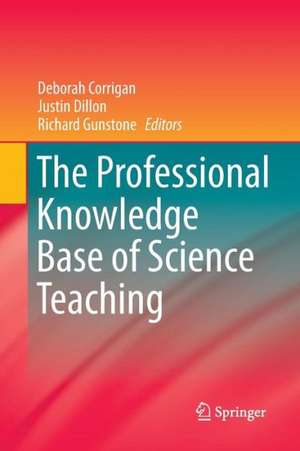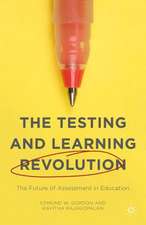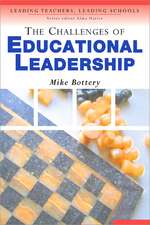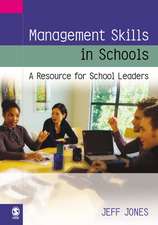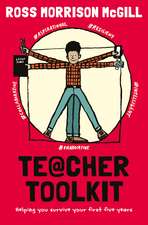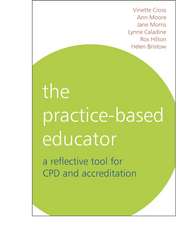The Professional Knowledge Base of Science Teaching
Editat de Deborah Corrigan, Justin Dillon, Richard Gunstoneen Limba Engleză Paperback – 11 noi 2014
| Toate formatele și edițiile | Preț | Express |
|---|---|---|
| Paperback (1) | 642.68 lei 6-8 săpt. | |
| SPRINGER NETHERLANDS – 11 noi 2014 | 642.68 lei 6-8 săpt. | |
| Hardback (1) | 649.87 lei 6-8 săpt. | |
| SPRINGER NETHERLANDS – 11 mar 2011 | 649.87 lei 6-8 săpt. |
Preț: 642.68 lei
Preț vechi: 756.09 lei
-15% Nou
Puncte Express: 964
Preț estimativ în valută:
122.99€ • 127.06$ • 102.36£
122.99€ • 127.06$ • 102.36£
Carte tipărită la comandă
Livrare economică 25 martie-08 aprilie
Preluare comenzi: 021 569.72.76
Specificații
ISBN-13: 9789401782975
ISBN-10: 9401782970
Pagini: 344
Ilustrații: XVI, 326 p.
Dimensiuni: 155 x 235 x 18 mm
Greutate: 0.48 kg
Ediția:2011
Editura: SPRINGER NETHERLANDS
Colecția Springer
Locul publicării:Dordrecht, Netherlands
ISBN-10: 9401782970
Pagini: 344
Ilustrații: XVI, 326 p.
Dimensiuni: 155 x 235 x 18 mm
Greutate: 0.48 kg
Ediția:2011
Editura: SPRINGER NETHERLANDS
Colecția Springer
Locul publicării:Dordrecht, Netherlands
Public țintă
ResearchCuprins
Sandra K. Abell - Science Classroom Assessment: What Teachers Need to KnowGlen Aikenhead - A Cultural View of Quality Science Teaching .- Amanda Berry & John Loughran - Making a case for improving practice: What can be learned about high quality science teaching from teacher produced cases?.- Debbie Corrigan & Dick Gunstone - An approach to elaborating aspects of a knowledge base for expert science teaching .- Maria Evagorou & Justin Dillon - Considering teachers’ instructional practices in argumentationPeter Fensham - Science teachers and the knowledge society.- Helmut Fischler - Didaktik – An appropriate framework for the professional work of science teachers?.- Beverley Jane and Jill Robbins – Teacher professional knowledge for foundation physics: Block play in early childhood education .- Alister Jones & Bronwyn Cowie – Enhancing teachers’ knowledges to enhance quality classroom interactions..- Stephen Keast & Rebecca Cooper – Developing the knowledge base of preservice science teachers – starting the path towards expertise .- Hongming Ma - Chinese teachers’ views of teaching culturally related knowledge in school science.- Alex Manning - Teachers’ views and experiences of working in an urban science department.- Sandy Martinuk, Anthony Clarke & Gaalen Erickson - Re-interpreting the teaching of Physics for non-majors: Motivations, constraints, and evolutions in curricular change.- Masakata Ogawa - RIKA (Japanese school science) Teachers’ Indigenized Professional Knowledge of RIKA Teaching: From Analysis of Their Discourses on Notions of RIKA Teaching.- Debra Panizzon – Teaching secondary science in rural and remote contexts: Developing appropriate pedagogical knowledge and classroom practice.- Léonie J. Rennie - Moving Beyond the Classroom: What Professional Knowledge Underpins Quality in Science Teaching?.- Lynn Uyen Tran & Heather King – Science educators in informal environments: Pedagogicalknowledge for educational professionals working outside of schools.
Textul de pe ultima copertă
Over the past twenty years, much has been written about the knowledge bases thought necessary to teach science. Shulman has outlined seven knowledge domains needed for teaching, and others, such as Tamir, have proposed somewhat similar domains of knowledge, specifically for science teachers. Aspects of this knowledge have changed because of shifts in curriculum thinking, and the current trends in science education have seen a sharp increase in the significance of the knowledge bases. The development of a standards-based approach to the quality of science teaching has become common in the Western world, and phrases such as “evidence-based practice” have been tossed around in the attempt to “measure” such quality. The Professional Knowledge Base of Science Teaching explores the knowledge bases considered necessary for science teaching. It brings together a number of researchers who have worked with science teachers, and they address what constitutes evidence of high quality science teaching, on what basis such evidence can be judged, and how such evidence reflects the knowledge basis of the modern day professional science teacher. This is the second book produced from the Monash University- King’s College London International Centre for the Study of Science and Mathematics Curriculum. The first book presented a big picture of what science education might be like if values once again become central while this book explores what classroom practices may look like based on such a big picture.
Caracteristici
Supports the importance of knowledge bases for successful teaching of science Explores what expert classroom knowledge and practices may look like if values once again become central Represents a range of perspectives on this centrally important issue by an international group of well-known researchers Includes supplementary material: sn.pub/extras
